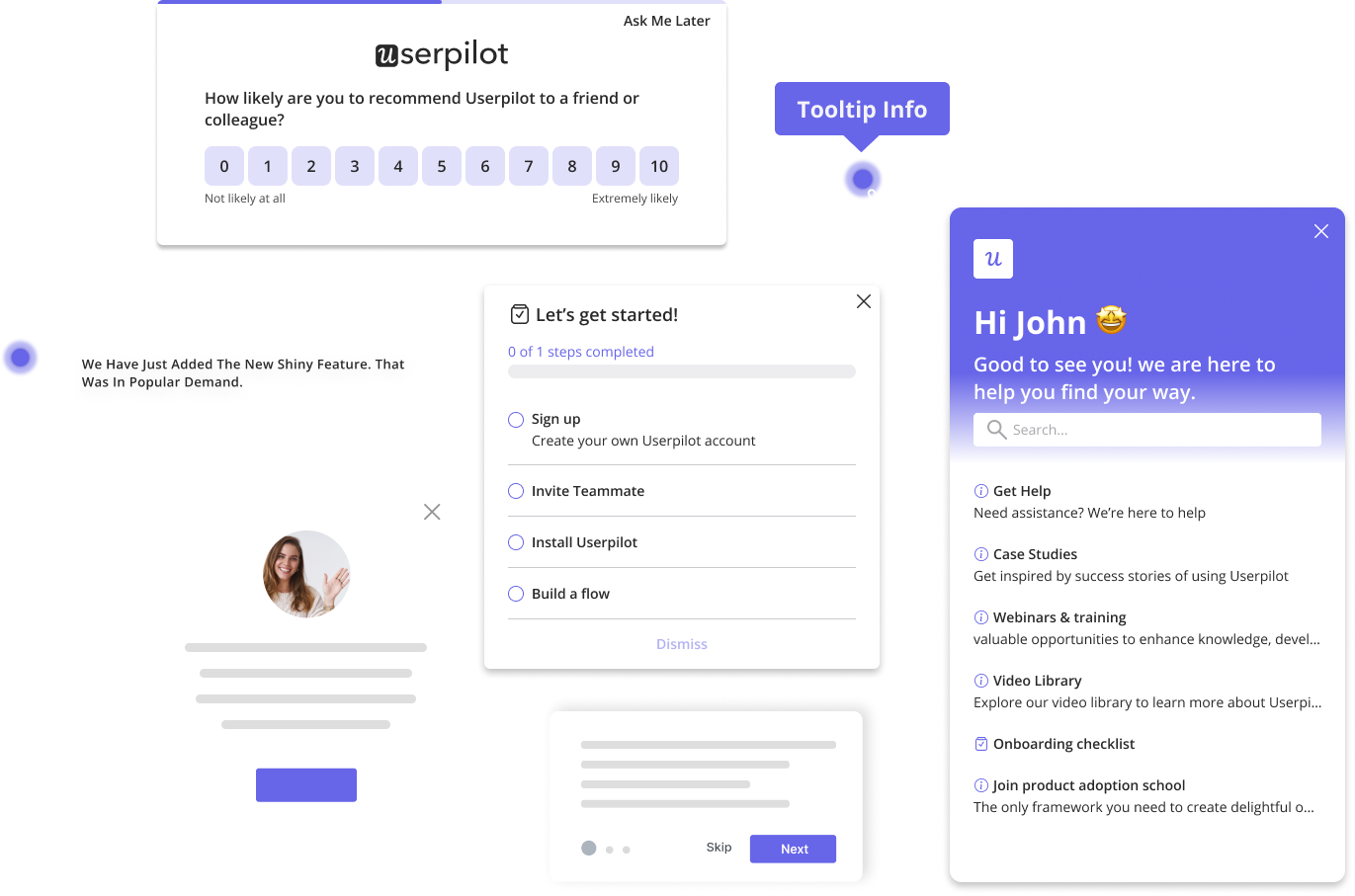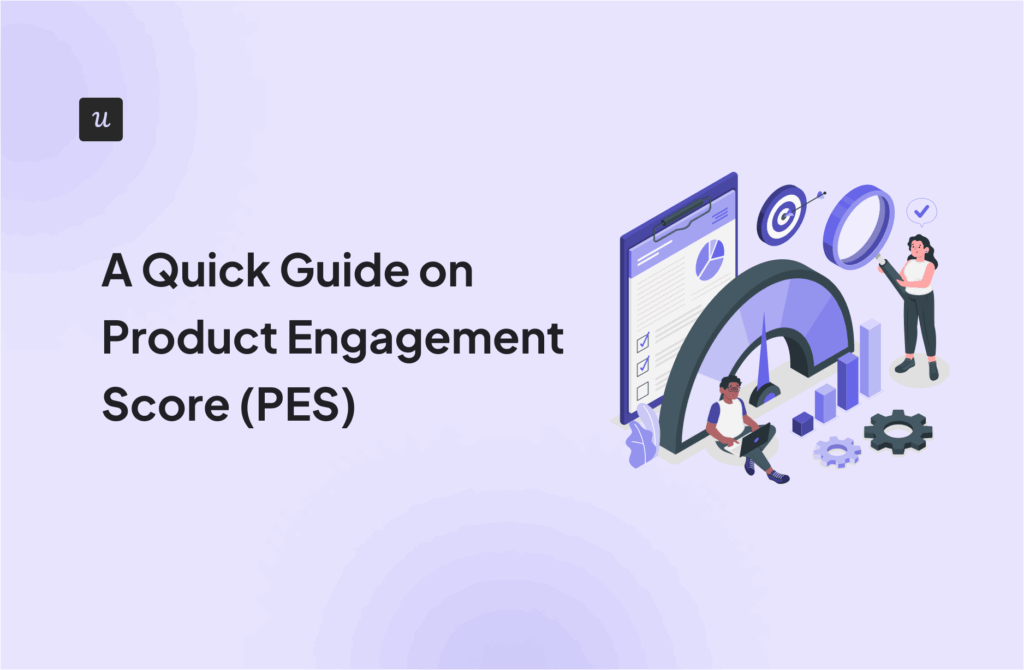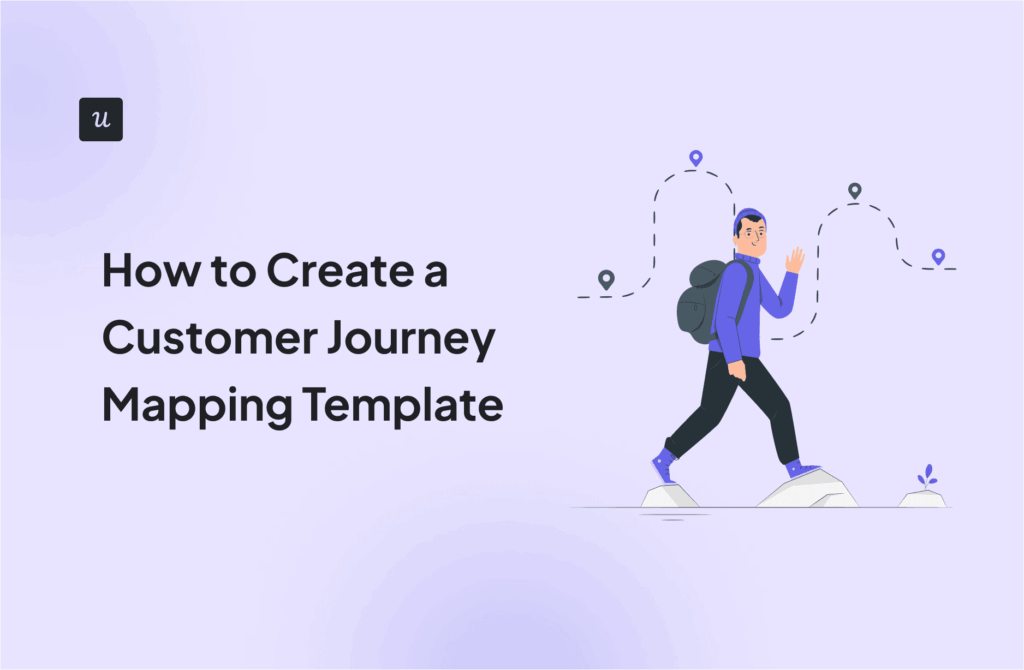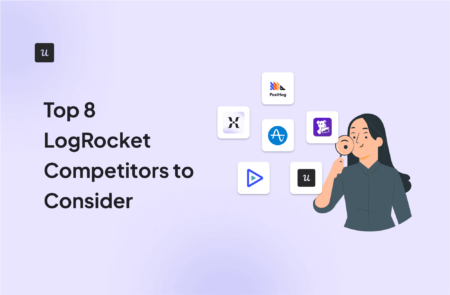
Does your business need more than session replays and quantitative data? Then it might be time to consider LogRocket competitors.
However, the best product analytics tools for you depend on factors other than having a wider range of features.
So let’s go over the best LogRocket alternatives, their ideal use cases, and how each tool compares to it so you can choose the right product.
Try Userpilot Now
See Why 1,000+ Teams Choose Userpilot

Tl;DR
- Userpilot: Choose Userpilot for comprehensive in-app engagement and deep user analytics, especially if you need an all-in-one product management tool.
- PostHog: Opt for PostHog if you value open-source flexibility and data privacy, and have the technical expertise to manage, self-host, and customize open-source software.
- Glassbox: Glassbox is ideal for large enterprises seeking detailed session replays and advanced customer journey analytics.
- FullStory: FullStory offers more detailed session replays and AI-built predictive analytics, making it a strong choice for companies focused on AI-driven insights.
- Marker.io: Use Marker.io for streamlined bug reporting with session replays, perfect for small to mid-sized development teams who are still growing their products.
- Hotjar: Hotjar is a more affordable and user-friendly option, ideal for small to mid-sized businesses needing solid user behavior analytics and feedback tools.
- Pendo: Pendo provides robust in-app guidance, user feedback, and product management tools, making it perfect for product-led companies who want an all-rounder PM platform.
- ContentSquare: ContentSquare offers advanced tools for journey analysis, heatmapping, A/B testing, feedback, and more. It’s designed for large enterprises that are focusing on optimizing their product experiences.
- If you want to see how Userpilot can also help you create in-app guides and collect qualitative feedback without coding, you can book a demo today for free.
#1: Userpilot
Userpilot is a user engagement and analytics platform designed for SaaS product teams. It’s particularly well-suited for mid-sized and enterprise companies that need to optimize product growth (though it’s also a cost-effective option for smaller businesses that need an all-in-one platform).
G2 rating: 4.6/5
Key features
- Advanced survey features with diverse triggering conditions, survey types, and sentiment analysis—all of which LogRocket lacks.
- Userpilot comes with default auto capture and low-code custom event tracking, making it good for less technical teams.
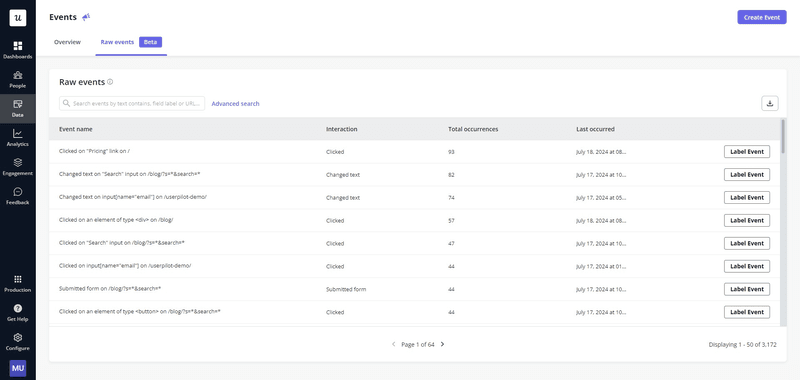
- Just like LogRocket, Userpilot also features reports to analyze funnels, paths, trends, and retention analysis.
- Customizable, no-code analytics dashboards with ready-made templates—similar to LogRocket.
- Userpilot offers deep user analytics that leverages account profiles, behavioral data, and segmentation.
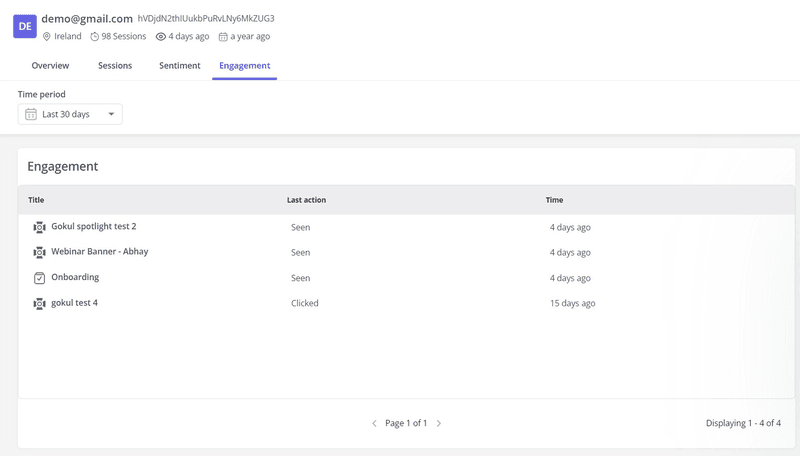
- Unlike LogRocket, Userpilot includes engagement features to trigger personalized in-app messages based on specific user properties and events—enhancing user engagement.
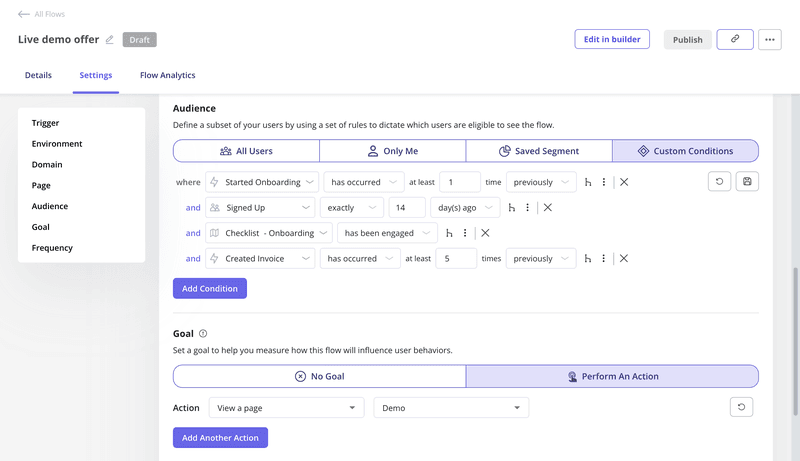
- Different from LogRocket, Userpilot allows you to perform different types of experiments for your product strategies (including controlled a/b testing, head-to-head a/b testing, and multivariate testing).
Userpilot pricing
Userpilot offers transparent, scalable pricing designed for SaaS businesses at different stages of growth. Plans start at $299/month and go up to a fully customizable Enterprise tier for larger organizations with advanced needs.
Even the entry-level plan includes access to all UI patterns and provides the essential tools most mid-market SaaS teams need to drive product adoption from day one.
Here’s a breakdown of the three paid plans:
-
Starter – $299/month (billed annually): Designed for teams getting started with product adoption, the Starter plan includes segmentation, product analytics, reporting, in-app user engagement, NPS feedback, and UI customization.
-
Growth – Custom pricing: Ideal for scaling teams, the Growth plan adds features like resource centers, advanced event-based triggers, unlimited feature tagging, AI-powered content localization, EU hosting options, and a dedicated Customer Success Manager.
-
Enterprise – Custom pricing: Built for large organizations with complex requirements, the Enterprise plan includes everything in Starter and Growth, plus custom roles and permissions, premium integrations, priority support, custom contracts, SLAs, SAML SSO, activity logs, security audits, and SOC 2/GDPR compliance.
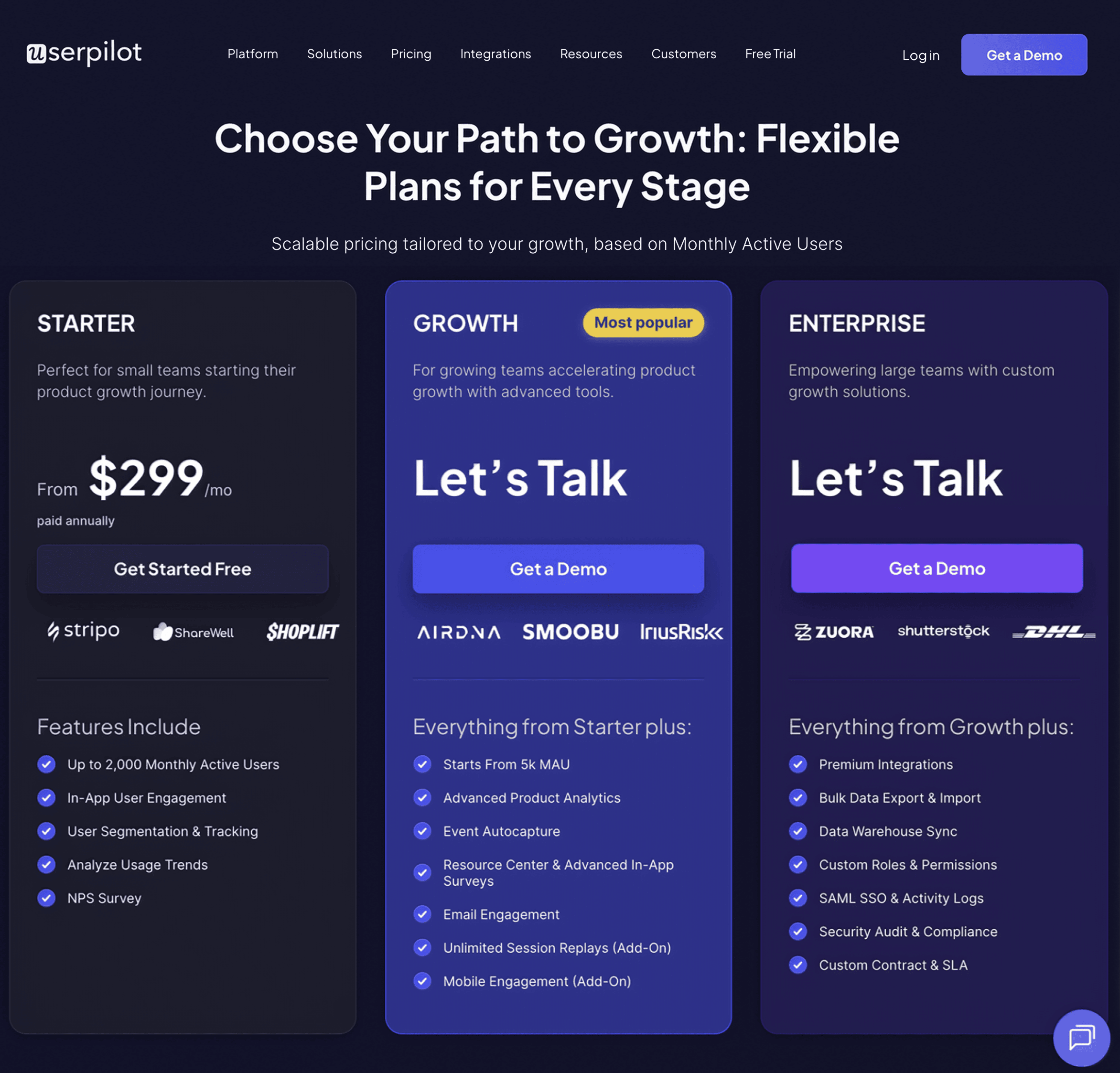
How does Userpilot stack up against LogRocket?
In short, Userpilot provides in-app engagement tools, deeper user analytics, and channels to collect qualitative data, making it ideal for teams who need an all-rounder solution.
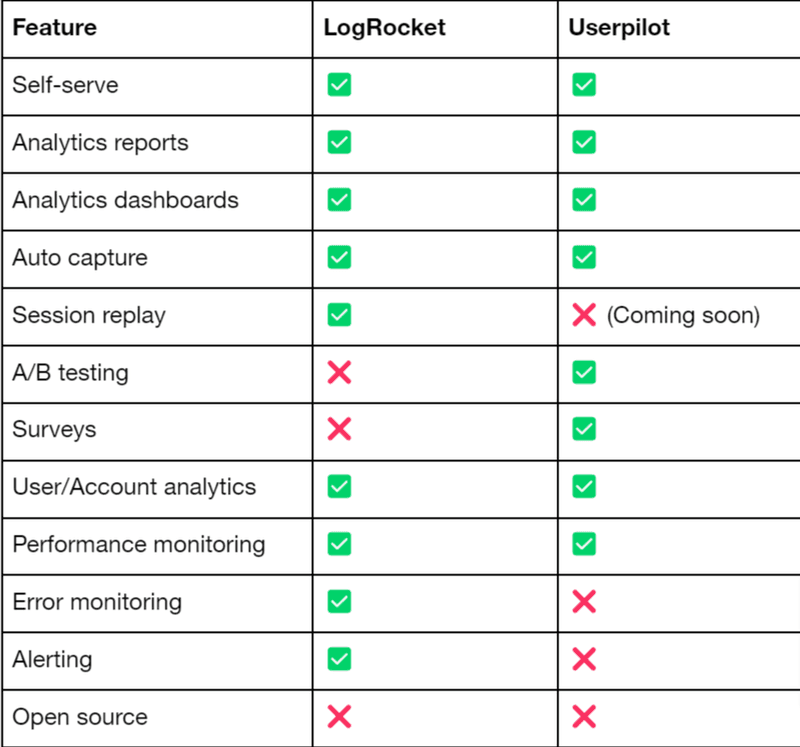
#2: PostHog
PostHog is an open-source product analytics platform designed for teams who prefer self-hosted solutions for customization. It’s best suited for mid-sized companies and enterprises that value data privacy and full control over their analytics infrastructure, plus own the technical resources to adapt it to the company’s needs.
G2 rating: 4.4/5
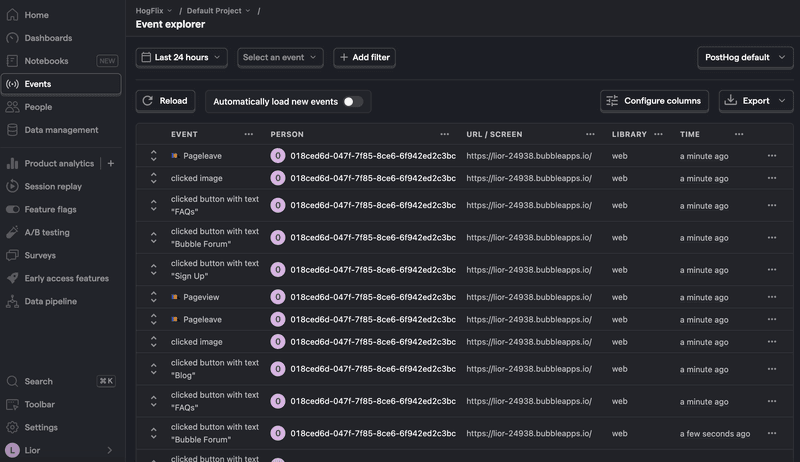
Key features
- Open-source: Complete control over your data, plus the ability to customize the platform. It’s the only open-source option in the market.
- Self-hosting: Ideal for companies who want to manage data privacy and cybersecurity themselves.
- Comprehensive analytics: Similar to LogRocket but with more flexibility in technical data management.
- Feature flags and A/B testing: Enables experimentation without additional tools or technical expertise—which LogRocket lacks.
- Session recording: In-depth session replay capabilities similar to LogRocket.
- Surveys: Unlike LogRocket, PostHog offers the ability to collect qualitative data with surveys.
- Event pipelines: Integrates with various data sources, offering more robust data pipelines than LogRocket.
Pricing
PostHog offers a generous freemium plan, a paid plan that scales with usage, and an enterprise plan that starts at $2000/mo. It’s particularly cost-effective for companies with the technical budget to manage, self-host, and customize open-source software.
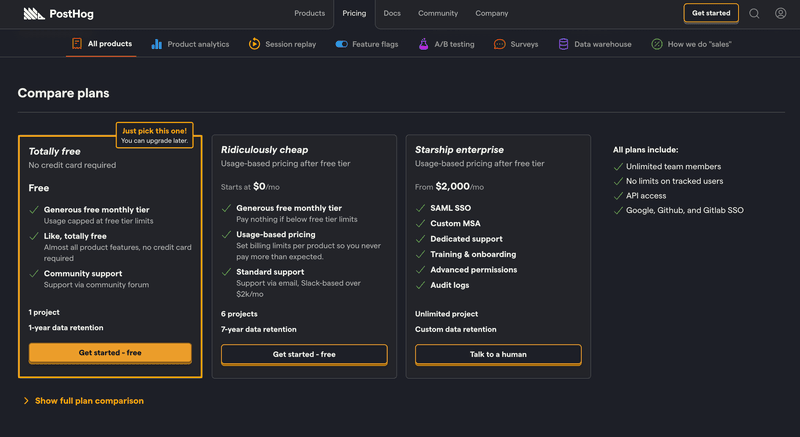
How does PostHog stack up against LogRocket?
PostHog provides greater control and customization, making it ideal for companies prioritizing data privacy and with the technical budget to leverage open-source software.
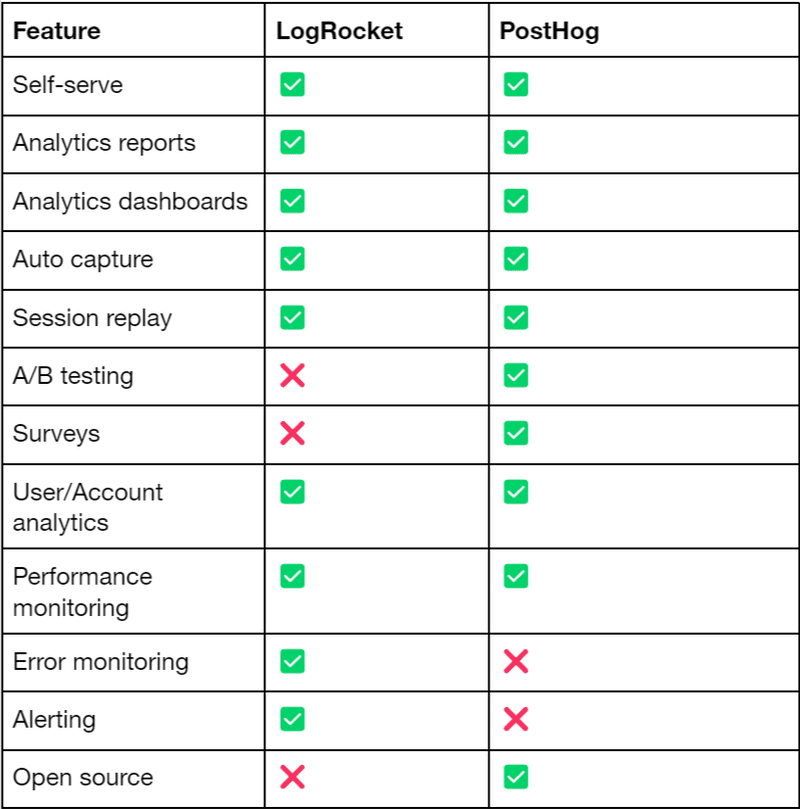
#3: Glassbox
Glassbox is an enterprise-level digital experience analytics platform that focuses on providing deep insights into customer journeys. It’s an excellent fit for large enterprises (including finances, Ecommerce, travel, insurance, and more) looking for deep session replays and journey analytics.
G2 rating: 4.9/5
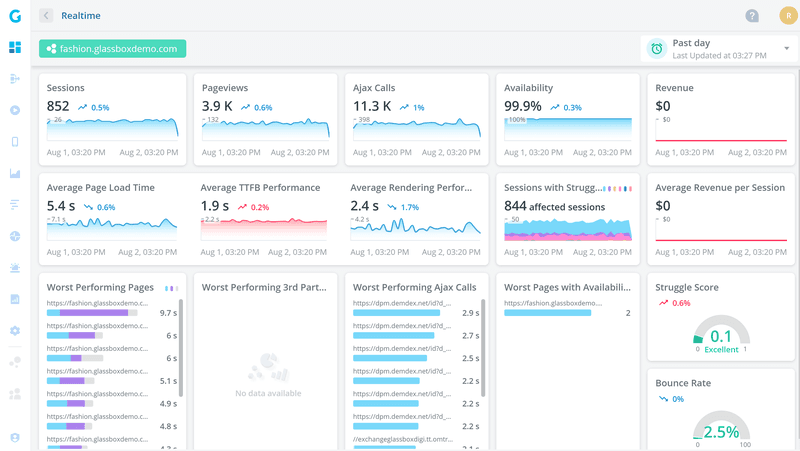
Key features
- Advanced session replay: More detailed than LogRocket, includes heatmaps, journey mapping, and sophisticated AI tools to detect friction.
- Customer journey analytics: In-depth insights into user behavior across multiple touchpoints. It goes deeper than LogRocket’s path analysis.
- AI-driven insights: Get access to an AI assistant that provides predictive analytics, helps you improve user experience proactively, and also measures user sentiment without having to send surveys.
- Comprehensive data security: Enterprise-grade data protection and compliance.
- Performance monitoring: Uses real-user monitoring (RUM) to spot technical issues in your app, calculate their effect on revenue, and help you prioritize fixes.
Pricing
Glassbox offers custom pricing tailored to enterprise needs, generally on the higher end of the pricing spectrum. While no free trial is available (only a demo), it offers robust enterprise-level features that can be worth the investment for larger companies.
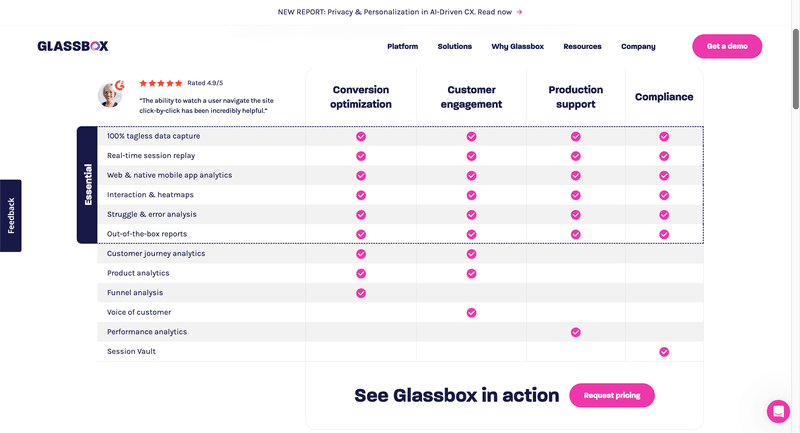
How does Glassbox stack up against LogRocket?
Glassbox not only offers deeper session replay and customer journey analytics than LogRocket, it’s a complete solution built for enterprises.
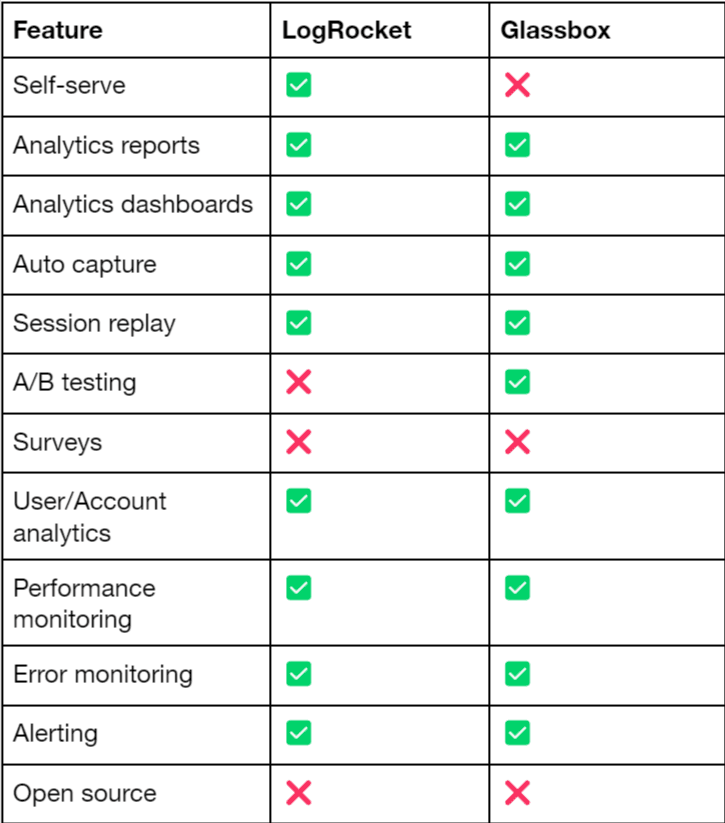
#4: FullStory
FullStory is a behavioral data platform that combines session replay with analytics, offers insights into customer behavior, feeds the data into the AI, and builds predictive models. It’s best suited for mid-sized to large enterprises that need a comprehensive view of what’s happening in their product.
G2 rating: 4.5/5
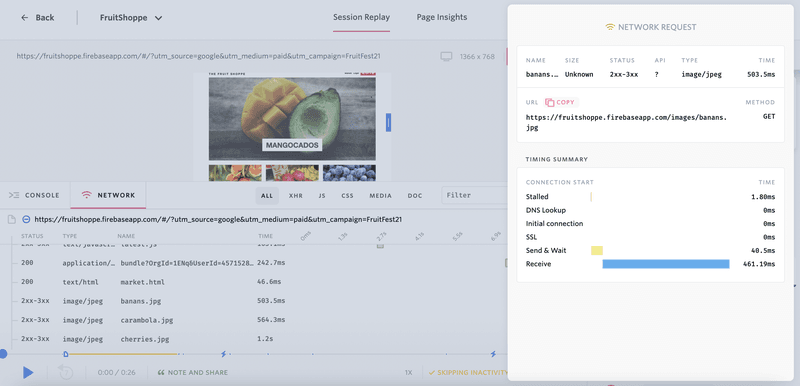
Key features
- Session replay: Highly detailed, offering more contextual insights than LogRocket with AI-generated summaries and privacy settings.
- Heatmaps and click maps: Visualize user interactions on your site similar to LogRocket’s tools.
- Predictive analytics: Fullstory feeds their AI with your behavioral data to build predictive models—which LogRocket lacks.
- Mobile apps analytics: Faster and more efficient than LogRocket since it omits screen recordings (saving valuable space), it only records the events, console logs, etc.
- Product analytics: Pulls most of the data from session replays into digestible dashboards and reports can be shared across your entire company.
Pricing
FullStory offers a limited freemium plan and a 2-week trial for the business plan (with up to 5,000 user sessions). The cost of the unlimited plans can be higher than LogRocket since it requires reaching out to their sales team, but it can provide more value to companies needing AI-driven user experience analytics.
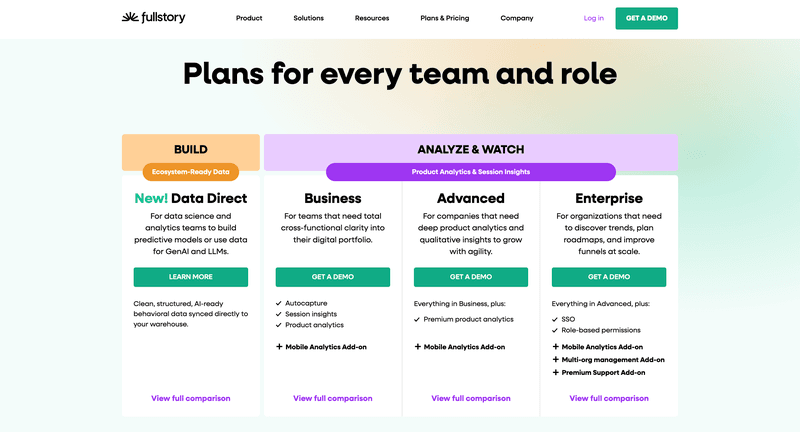
How does FullStory stack up against LogRocket?
FullStory offers more detailed session replays and user behavior analytics than LogRocket, plus it features AI-driven predictive analytics for even deeper insights.
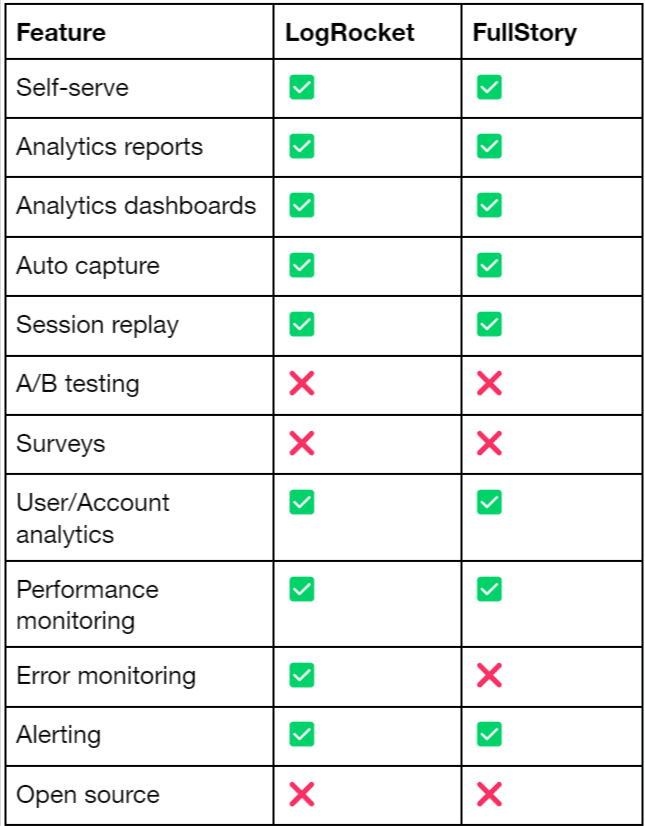
#5: Marker.io
Marker.io is a visual bug reporting tool that collects feedback and allows you to watch a session replay of the reports. It’s particularly well-suited for small to mid-sized development teams who need to streamline bug reporting.
G2 rating: 4.8/5
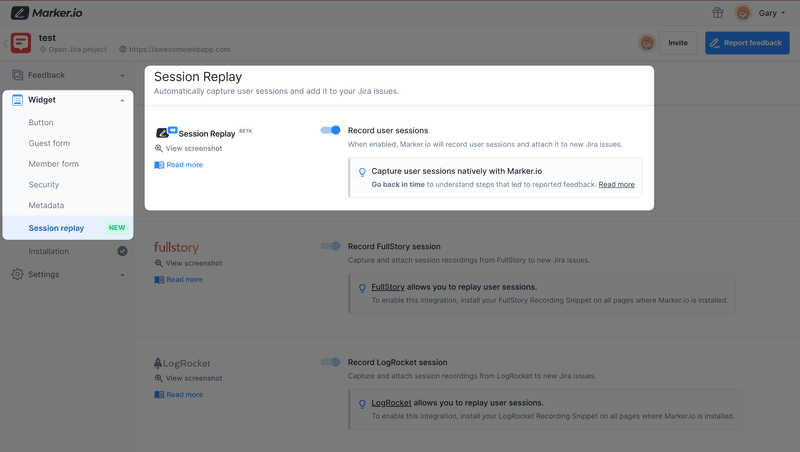
Key features
- Visual feedback: Simplified bug reporting directly from the site, which LogRocket lacks. Plus, you can reproduce the reporter’s session to see what happened.
- 2-way integration with PM tools: Including Jira, Trello, and Asana.
- Screenshot annotation: Capture screenshots and annotate messages or arrows for more precise reporting.
- User feedback collection: Gather user insights directly from your product interface without cluttering your app.
Pricing
Marker.io offers a tiered pricing model ranging from $39/month to $99/month, with a 15-day free trial available. It’s an affordable option for smaller startups who are growing their product, and thus need a more efficient way to deal with bugs.
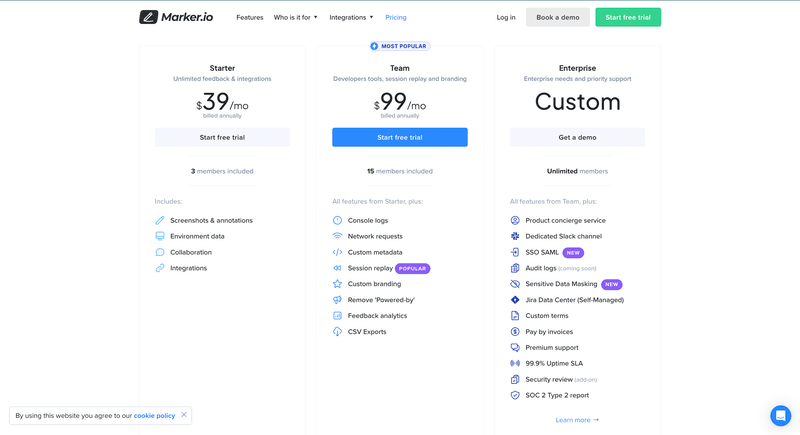
How does Marker.io stack up against LogRocket?
Marker.io is a simpler tool that focuses on bug tracking, it’s only a better choice than LogRocket if your team needs quicker and more effective feedback loops.
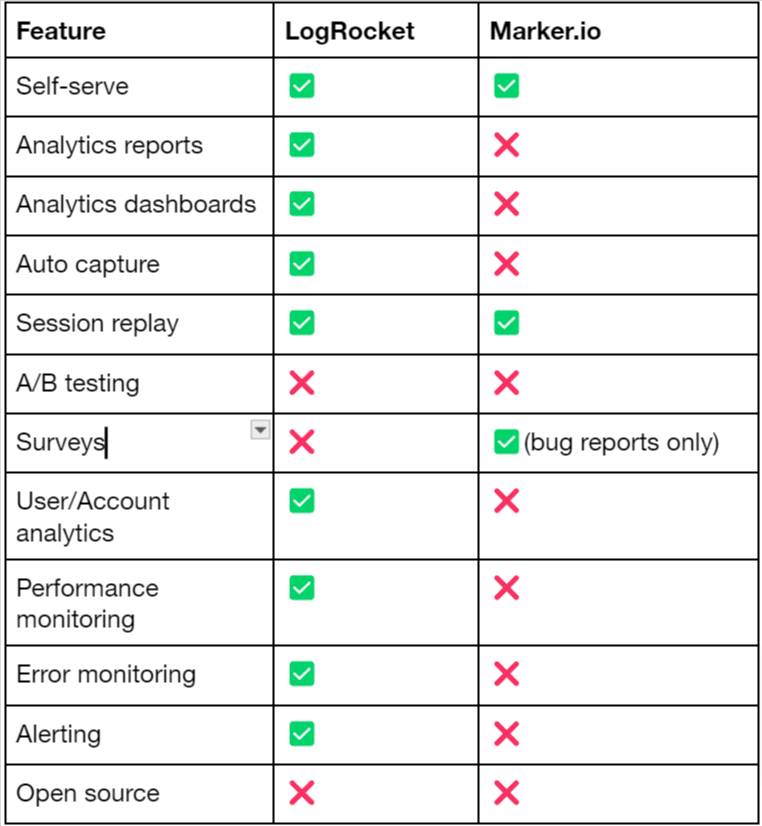
#6: Hotjar
Hotjar is a popular user behavior analytics tool that provides insights through heatmaps, session recordings, and feedback surveys. It’s well-suited for small to mid-sized businesses looking for an affordable way to analyze user behavior.
G2 rating: 4.3/5
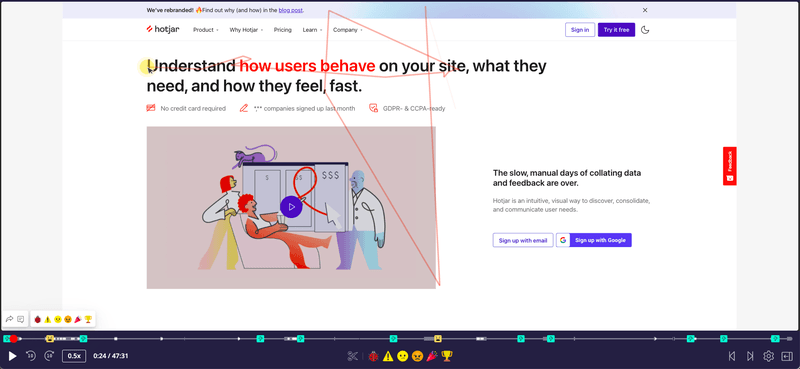
Key features
- Heatmaps and session recordings: More user-friendly than LogRocket, with a focus on usability.
- Surveys and feedback polls: Unlike LogRocket, it offers built-in tools for collecting qualitative user feedback.
- Conversion funnel analysis: Basic funnel analytics to understand drop-off points, similar to LogRocket.
- 1-on-1 interviews: Hotjar allows you to perform market research by interviewing participants from any part of the world.
Pricing
Hotjar offers a free basic plan, with paid plans ranging from $32/month to $171/month. This makes it a cost-effective option for smaller businesses or teams with limited budgets.
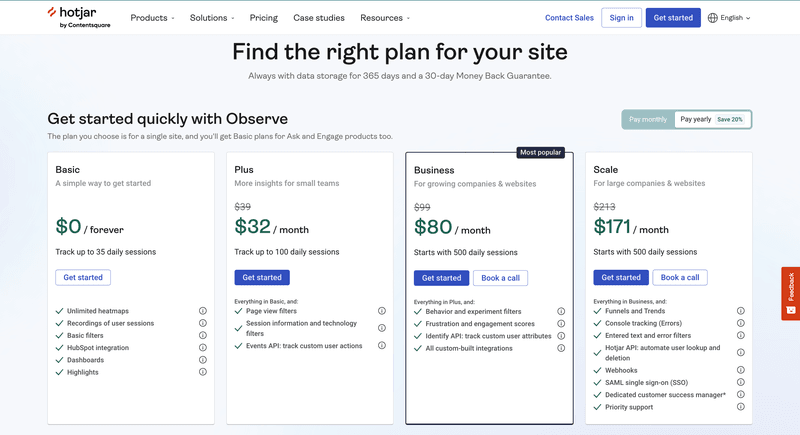
How does Hotjar stack up against LogRocket?
Hotjar is more user-friendly and affordable than LogRocket, plus it includes surveys for qualitative feedback.
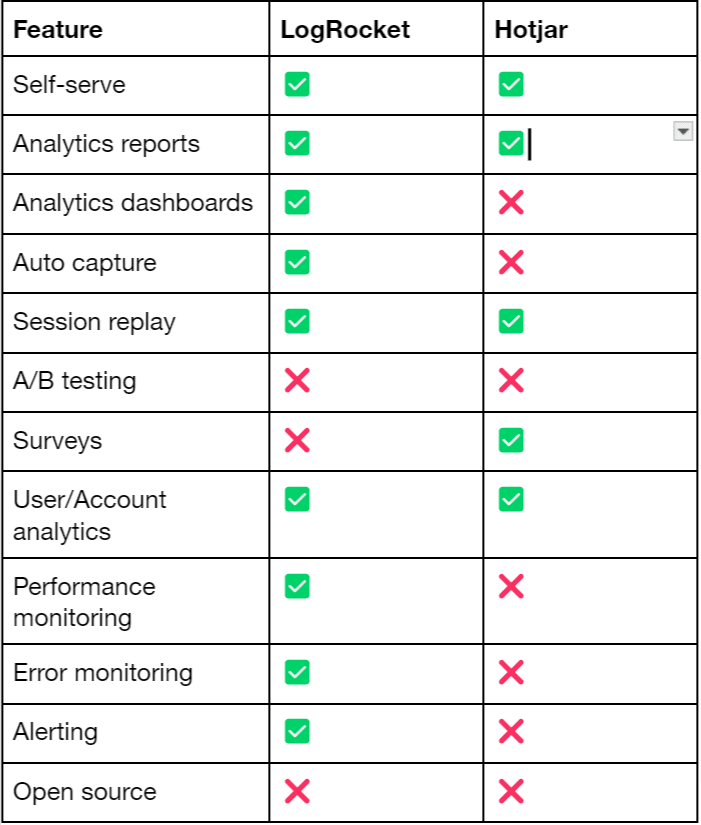
#7: Pendo
Pendo is a product experience platform that helps teams deliver better digital experiences with product analytics, session replays, and in-app guidance. It’s particularly well-suited for mid-sized and large enterprises that need detailed user insights and customer engagement tools.
G2 rating: 4.4/5
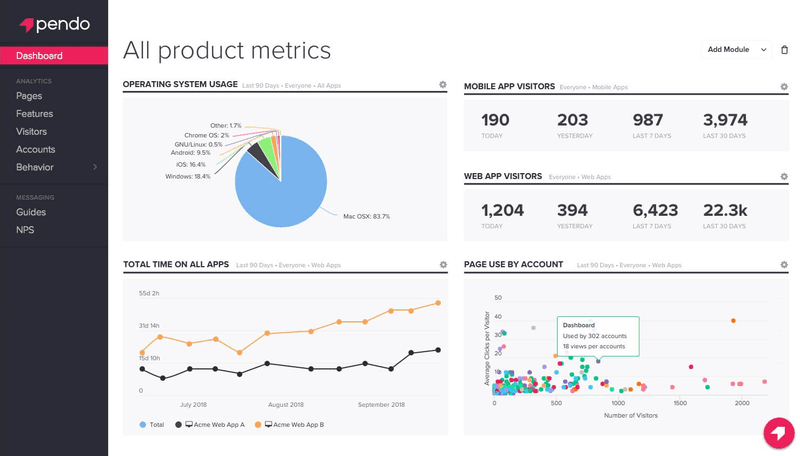
Key features
- In-app guidance: Unlike LogRocket, Pendo has advanced features for creating user onboarding flows and in-app messages.
- Product analytics: Track users’ interactions with your product based on in-app events. Whereas LogRocket focuses on session recordings.
- User feedback: Built-in tools for gathering and analyzing user feedback—which LogRocket lacks.
- Roadmapping and planning tools: Pendo features native tools for product management tasks like roadmapping and planning product updates, which you won’t find in LogRocket.
- Customizable dashboards: Similar to LogRocket, you can also create custom dashboards to visualize key metrics and trends.
Pricing
Pendo offers custom pricing based on the specific needs of the business, with a free trial available. This means it is more cost-effective for larger companies that need integrated product analytics and engagement tools.
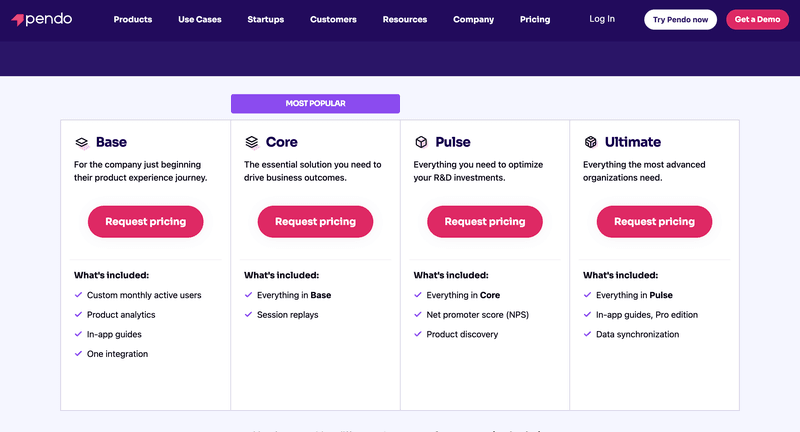
How does Pendo stack up against LogRocket?
Pendo provides more comprehensive in-app guidance tools, surveys, and product management features—ideal for product-led companies who want an all-in-one platform for PM.
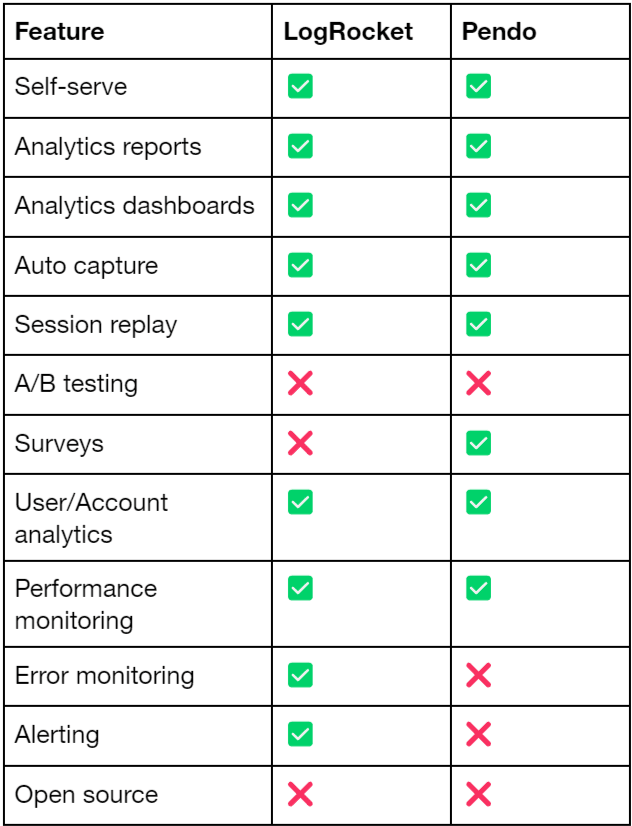
#8: ContentSquare
ContentSquare is a digital experience analytics platform designed for large enterprises that need detailed insights into customer journeys. It’s especially fitting for corporations looking to optimize their websites and apps for user experience using advanced tools that can manage large sets of data.
G2 rating: 4.7/5
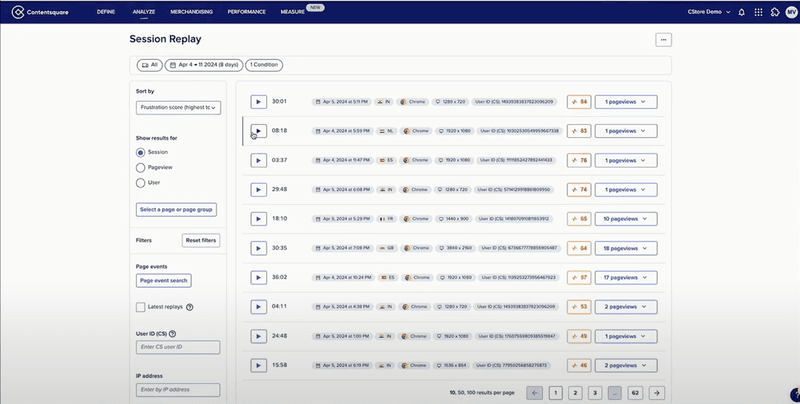
Key features
- Journey analysis: More detailed than LogRocket, with advanced path and flow analysis.
- Zone-based heatmaps: Visualize user interactions on different sections of your website and A/B test their performance.
- Session replay: In-depth replay capabilities with more context than LogRocket.
- Product analytics: Unlike LogRocket, it includes cross-session analysis, deep segmentation, and retention cohorts with more filtering options.
- Voice-of-Customer (VoC): Collect customer feedback with NPS surveys, exit intent surveys, feedback buttons, and more.
Pricing
ContentSquare offers custom pricing based on your site’s pageviews and your business needs. It’s a premium tool, generally more expensive than LogRocket but justifiable for large enterprises needing an advanced, high-capacity platform.
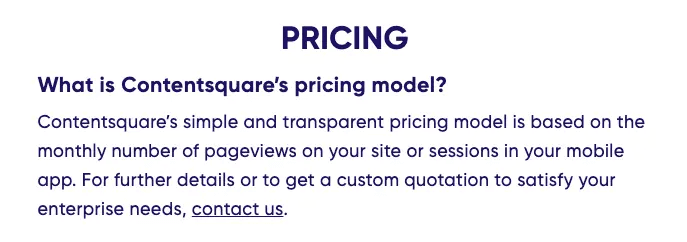
How does ContentSquare stack up against LogRocket?
ContentSquare provides advanced journey analysis, heatmap, A/B tests, feedback collection, and deeper features than what LogRocket can offer. That said, the platform is designed for enterprises rather than startups—keep that in mind.
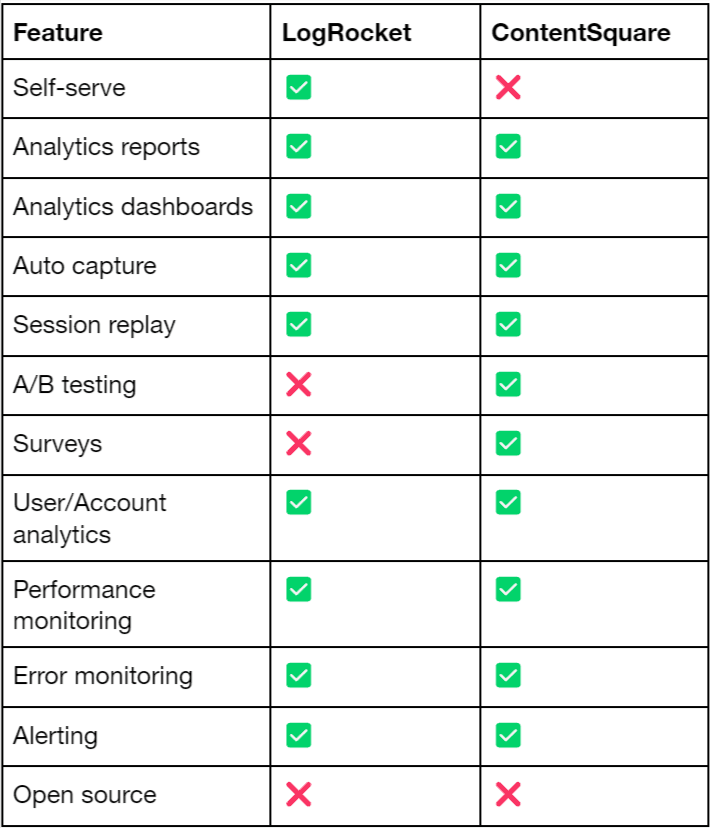
Conclusion
Choosing the LogRocket competitors depends on your company’s specific needs and priorities.
While LogRocket offers robust session replay and error tracking, alternatives like Userpilot, PostHog, and Pendo provide a wider set of features that might better suit your use case (and probably save money on buying other tools to complement the features that LogRocket lacks).
That said, if you want to see how Userpilot can also help you create in-app guides and collect qualitative feedback without coding, you can book a demo today for free.

